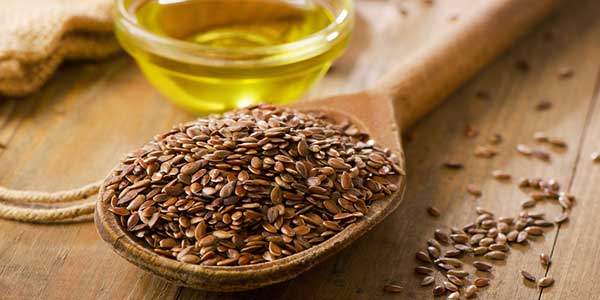
5 Health Benefits of Flaxseed
And-as most of us have probably already heard-omega 3's are extremely important ingredients in our daily diets, helping us stave off heart disease and the dreaded inflammation that seems to be causing every illness known to mankind.
Yes, you read that correctly, inflammation is a major contributor to the progression of many chronic diseases, including heart disease, cancer, stroke, Alzheimer's disease, diabetes, kidney disease, and chronic lower respiratory disease. All of these fall within the top 10 leading causes of death in the United States.
Inflammation is also responsible for the symptoms associated with asthma, peptic ulcers, rheumatoid arthritis, sinusitis, and carpal tunnel syndrome. And flaxseed contains the omega 3 fatty acids that your body desperately needs to help cool, calm, and reduce some of that inflammation.
Diets that are rich in omega 3 fatty acids from foods like avocadoes, chia seeds, walnuts, soybean oil, and flaxseed are associated with better health and a reduced risk of cardiovascular disease. Just 1 tablespoon of whole flaxseeds contains 2.3g of omega 3 fatty acids, which is twice the recommended intake of 1100mg of omega 3 fatty acids for adults.
So is Flaxseed Healthy? Let us Count the Ways.
Flaxseed is oh-so-good-for-you above and beyond just the vegetarian omega 3's it contains. Some of the other health benefits of flaxseed include the rich lignan content, as well as a good dose of fiber.
1. Lignans are tiny, little, fat-soluble molecules in flaxseeds that serve as powerful antioxidants, and help keep fatty acids from becoming oxidized in the body. A diet rich in lignans is related to a reduced risk of cardiovascular disease, as well as some cancers.
2. Flaxseeds also contain lutein and zeaxanthin, which are two molecules that are mirror images of each other. These two molecules are extremely beneficial to eye health, with 67 mcg total in 1 tbsp whole flaxseeds. Lutein and zeaxanthin are powerful antioxidants that function throughout your entire body to fight free radicals, but they are especially important for keeping your eyes healthy.
3. Another health benefit of flaxseed-the isoflavones. Isoflavones are similar to lignans, in that they are a type of phytoestrogen. While there has been a lot of controversy with the health benefits of soy isoflavones, the isoflavones from flaxseeds are present in small amounts-about .13mg total in a tablespoon. In general, concentrated amounts of isoflavones are required for a very weak, estrogenic effect, which can help lower cholesterol levels, and may improve symptoms associated with menopause.
4. As mentioned above, flaxseeds are rich in plant sterols--which is a plant form of cholesterol that blocks the uptake of animal-sourced cholesterol. Another health benefit of flaxseed, these sterols can help lower the amount of animal cholesterol that you absorb from a meal.
5. Last but certainly not least, one of the best health benefits of flaxseeds is the amount fiber these tiny little seeds contain. Just 1 tablespoon of whole flaxseeds contains nearly 3 grams of fiber. For women, the USDA recommends consuming 25g of fiber daily, and men need around 38g of fiber per day. Adding in fiber wherever you can will go a long way to ensure you stay healthy.
Flaxseed and Some Medications Can Interact
Before you begin using flaxseed regularly, talk to your doctor if you bruise easily, have any form of a bleeding disorder, or if you are taking a blood thinner, like warfarin (Coumadin), clopidogrel (Plavix) or a daily aspirin.
Even if you are healthy, you wouldn't want to exceed 3 grams per day of omega-3 fatty acids, as this can cause an increased risk of bleeding. So as with most healthy foods, too much of a good thing is probably not such a good idea.
How to Use Flaxseed
One of the easiest ways to use flaxseed is to buy a bag of golden or brown flax seeds, and sprinkle them over oatmeal, bake them in cookies, or add them to salad dressings. Anywhere that you would normally use sesame seeds, you can replace with flaxseeds.
Blend some flaxseeds in your next protein shake for a healthy dose of omega 3 fatty acids, fiber, lignans, isoflavones, lutein, zeaxanthin, as well as plant sterols.
Another way to ensure all the goodness of flaxseeds gets absorbed into your system-use a grinder to make freshly ground flaxseed. Just use a spice or coffee grinder, and if you want to toast the flaxseeds briefly before this will release an aromatic, nutty flavor that is truly hard to resist.
Mix ground flaxseed with almond butter for a truly nutty and delicious spread, or stir into your batch of bran muffins for an extra dose of fiber and flavor.
References:
Centers for Disease Control and Prevention 2011.
United States Department of Agriculture. Agricultural Research Service National Nutrient Database for Standard Reference Release 27. Accessed 03.26.2015.
D.D. Kitts, Y.V. Yuan, A.N. Wijewickreme, L.U. Thompson. Antioxidant activity of the flaxseed lignan secoisolariciresinol diglycoside and its mammalian lignan metabolites enterodiol and enterolactone. Molecular and Cellular Biochemistry. December 1999, Volume 202, Issue 1-2, pp 91-100.







